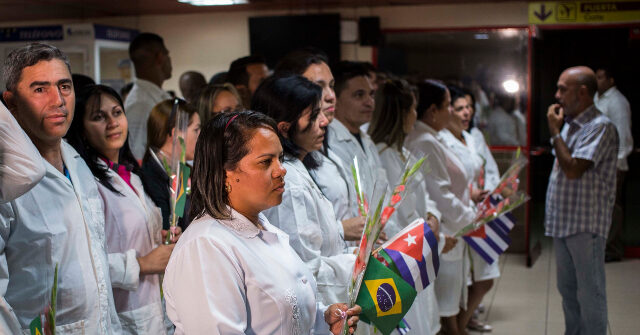The United States will impose visa restrictions on Brazilian government officials involved in the Mais Medicos (“More Doctors”) program, an initiative linked to the Cuban regime’s longstanding slave doctor scheme, Secretary of State Marco Rubio announced on Wednesday.
The restrictions will also extend to officials from the Pan American Health Organization (PAHO), a regional subsidiary of the World Health Organization (W.H.O.) that helped broker the slave doctor deal between Cuba and Brazil.
“The State Department is also taking steps to revoke visas and impose visa restrictions on several Brazilian government officials and former PAHO officials complicit in the Cuban regime’s forced labor export scheme. Mais Médicos was an unconscionable diplomatic scam of foreign ‘medical missions,’” Sec. Rubio wrote on social media.
The announcement comes hours after Breitbart News exclusively reported that the State Department would begin imposing visa restrictions on officials of other countries that have brokered deals to buy Cuban slave doctors from the communist regime.
For years, the Cuban regime has pocketed billions of dollars from its so-called “medical missions,” which consist of sending thousands of slave doctors to countries around the world. The slave doctors receive a small fraction of what each host country pays for their labor, while the Castro regime keeps the rest, funding its repressive apparatus and human rights violations against Cuban citizens.
The slave doctor business is one of the Castro regime’s main funding sources, alongside the military-controlled tourism and remittance industries — both of which the administration of President Donald Trump has recently taken action against.
Throughout the years, numerous former Cuban slave doctors have denounced the harrowing and often inhumane treatments they were subjected to and how they were forced to falsify performance records and destroy medicine to make the program seem more successful than it actually was. Defectors from the program are punished with an eight-year ban from entering their own country under penalty of prison. The ban often forces doctors to miss out on their children’s childhoods.
In the case of Brazil, the use of Cuban slave doctors is tied to Mais Medicos, an initiative originally launched in 2013 during the administration of socialist former President Dilma Rousseff, a protégé of radical leftist President Luiz Inácio Lula da Silva. Rousseff was impeached and removed from office in 2016 under corruption allegations.
Conservative former President Jair Bolsonaro has been a vocal critic of Mais Medicos, condemning the deal as early as 2013, when he served as a member of the Brazilian Congress. The Castro regime ended the program in 2018 during Bolsonaro’s administration after Bolsonaro demanded that the slave doctors be paid a reasonable salary directly, without the Castro regime acting as an intermediary. Bolsonaro also demanded that the Castro regime grant the slave doctors the freedom to bring their families with them on the “missions.”
In 2019, Bolsonaro replaced Mais Médicos with Médicos pelo Brasil (“Doctors for Brazil”), a program that did not rely on Cuban slave doctors and that allowed slave doctors still in the country to continue working in the country under better conditions.
After he returned to power for a third term, President Lula relaunched Mais Medicos in March 2023 — now rebranded as Mais Médicos para o Brasil (“More Doctors for Brazil”).
Brazilian Health Minister Alexandre Padilha responded to Sec. Rubio’s announcement in a social media post in which he claimed that Mais Médicos will “survive … the unjustifiable attacks of anyone.” Padilha also stood in defense of Pix, a Brazilian payment system currently part of a U.S. probe on Brazil’s unfair trading practices.
“The program saves lives and is approved by those who matter most: the Brazilian population,” Padilha wrote. “We will not bow down to those who persecute vaccines, researchers, science, and now two of the key figures behind Mais Médicos during my first term as Minister of Health, Mozart Sales and Alberto Kleiman.”
“In this current administration, in two years, we have doubled the number of doctors in Mais Médicos. We are very proud of this legacy, which brings medical care to millions of Brazilians who previously had no access to healthcare,” he continued. “We will remain firm in our positions: health and sovereignty are not negotiable. We will always stand with the Brazilian people.”
Cuban Foreign Minister Bruno Rodríguez Parrilla said on Wednesday on social media that the Castro regime will “continue to provide services” despite the United States’ visa restrictions against governments who have “legitimate medical cooperation agreements” with Cuba.
President Donald Trump signed an executive order in late July identifying Brazil as a national security threat to the United States and imposed a 50-percent tariff on Brazilian goods entering the United States.
President Trump cited the “witch hunt” against former President Bolsonaro and the numerous attacks and censorship actions against conservative voices in Brazil — as well as censorship actions against U.S. nationals and U.S.-based platforms — committed by Supreme Federal Tribunal (STF) Justice Alexandre de Moraes as reasons for the tariffs.
De Moraes was targeted with human rights sanctions under the Global Magnitsky Act. The State Department also revoked the U.S. visas of several Brazilian Justices and goverment officials allied with de Moraes.
Christian K. Caruzo is a Venezuelan writer and documents life under socialism. You can follow him on Twitter here.
Read the full article here


